A journalist, Janet Malcolm once wrote, preys “on people’s vanity, ignorance, or loneliness, gaining their trust and betraying them without remorse.” Great profiles always seem to contain an element of backstabbing. That’s why it’s wrong to write one of a child. When journalists betray their subjects, they are at least adults; they don’t need to be protected from the world and themselves. An 11-year-old child does.
That good journalists for major publications spend time profiling child prodigies in classical music, even the pieces they never reach the status of immortal writing, speaks volumes about our genre’s collective psyche. Prodigies exist in every field. But since the time of Leopold Mozart, who dragged his son through the drawing rooms of Europe’s nobility like a trained monkey, the prodigal youngster has become a familiar, peculiar trope in classical music hagiography.
In February, the Guardian profiled Alma Deutscher, who plays the violin and the piano, and composes her own music. This could have been an opportunity: the limits on what can ethically be written about a phenomenally talented child mean there is more space to reflect on society instead, its expectations, projections, needs. Nicholas Wroe does briefly engage with the darker side of prodigy reception in his piece, writing that they “have attracted awed attention from the general public, renowned as much for the horror stories of burnout that can surround them as for their gifts.” But then he moves on to listing Deutscher’s accomplishments with a matching age to each. The text itself becomes an artifact of this “awed attention.”
“At the London recital there was much amazement at Deutscher’s poise and skill,” Wroe writes. He doesn’t mention what the exact markers for these traits are. Do they come across through her well-bred appearance, or the satisfying incongruity of a child confidently entering the realm of the adult? In an interview with VAN, the violinist Christian Tetzlaff says, “I can understand why people are amazed by a 10-year-old juggler at the circus. But in music, it’s not about ability.”
Of course, at least on some level, classical music is about ability, or mastering a craft. The score has to be learned, the technique internalized. There are clear rules of harmony, structure, and form. With practice and a knack for imitation, these are things that a talented child can master. But, Teztlaff says, “When a kid is playing, you can’t really tell if he’s just imitating someone else well, or if he really is passionate about getting the message of the music across…Brahms doesn’t care if the violinist is 10 or 40. Except that if a 40-year-old is playing, then the chance is much higher that he has actually experienced what he’s trying to communicate.”
Do musicians need to have at least started living full lives, experienced love and loss and loneliness before this communication can take place? In his study of families and diversity, Far from the Tree, Andrew Solomon quotes the pianist Leon Fleisher, who agrees with Tetzlaff: “You can either perform a piece as though you’re in the midst of what’s happening, or as a narrator. You know, ‘Once upon a time, there was…’ That can be more expressive. It frees the listener’s imagination. It doesn’t dictate, ‘This is what I feel, there you should feel this.’ A prodigy can’t do that, but a fully developed performer can.”
In a profile of Deutscher for Die Zeit, the well-known journalist Uwe Jean Heuser asks, “Who is this child who, at the age of 10, is capable of amazing an ambitious, knowledgeable audience?” Isn’t the real question: Who is this audience that allows itself to be amazed by a child? Is “ambitious” or “knowledgeable” really the right way to describe an audience that is satisfied by “poise and skill,” when it should expect communicated life experience, storytelling, expression? Are these qualities really so much harder to judge in musicians? As Solomon writes, “Musical prodigies are sometimes compared to child actors, but child actors portray children; no one pays to watch a six-year-old playing Hamlet.”
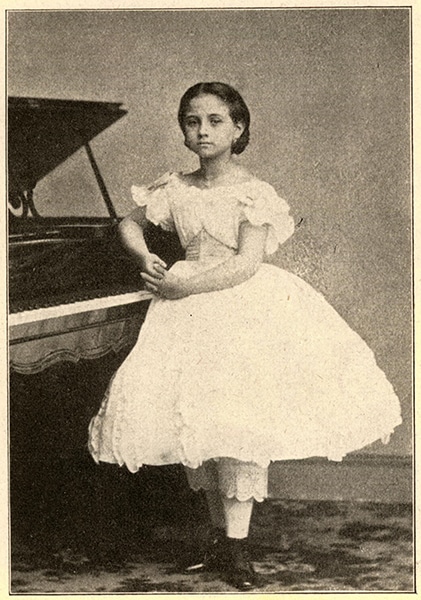
In his story “The Infant Prodigy,” Thomas Mann describes a concert which sounds like it could have been Deutscher’s “London recital”: “All these people sat there in their regular rows, looking at the prodigy and thinking all sorts of things in their regular brains.” The critic, the impresario (who believes “anything worth having is worth paying for”), an old man, a businessman, a piano teacher, a young girl, an officer, a critic, even other children, “their legs hanging down demurely from their chairs and their shining eyes staring at their gifted little white-clad contemporary.” Mann continues:
And the applause burst forth, unanimously, enthusiastically; the child made his demure little maidenly curtsy and people in the front seat thought: “Look what slim little hips he has! Clap, clap! Hurrah, bravo, little chap. Saccophylax or whatever your name is! Wait, let me take off my gloves—what a little devil of a chap he is!”
In Solomon’s book, the pianist Mitsuko Uchida calls classical music’s love of prodigies a “bewildering preoccupation.” She adds, “Ask those audiences how they’d like to be represented in court by a seven-year-old; let them try surgery with a very gifted eight-year-old.” True, the stakes for the audience are lower in a concert. But it also doesn’t seem true that audiences are simply taking music less seriously than other fields.
So what makes a performance by a child so special? Is it a sense of magic, or the feeling that perhaps a higher power does exist and bestows talent upon the chosen? Is it a trace of roads not taken in our own lives, or the display of seemingly immediate mastery of skills that most people need lifetimes to learn? Is it the victory of nurture over nature, like a tamed tiger at Siegfried and Roy’s?
To be able to juggle, all you need is excellent physical coordination. The spectacle of a child playing a Scarlatti sonata is more than that—it can be seen as a kind of acculturation to a specific, Western tradition. A kid playing adult music is performing adult emotions. She is concentrated and well-dressed, not wild and silly. Maybe what’s really fascinating for audiences is simply that the prodigy seems to have been so perfectly brought up. Maybe, we think, high culture really does make people better. Alma Deutscher’s world is one where Victorian virtue is exciting, and conformity is cute.
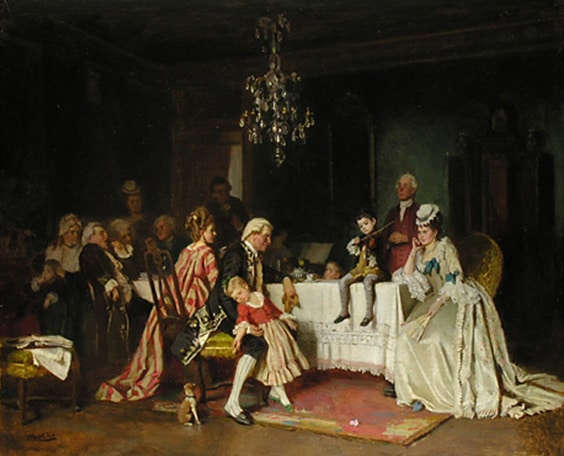
For Wroe, what makes Deutscher truly exceptional is not necessarily that she performs so well, but that she composes. Her first opera premiered last year. “It is as a composer that she is unusually gifted,” he writes.
But what exactly does she write? “The music is memorably pretty, drawing heavily on the simplicity and immediacy of the 18th-century galant style,” according to Wroe, and Deutscher herself adds that “when the harmony is very clashing I just don’t like it.”
Deutscher is home schooled, though “not for any ideologically reason.” She can learn at her own (faster) pace, and play with her omnipresent skipping rope—play that also serves to free up her head for musical inspiration. Heuser, for Die Zeit, describes her routine of composing, practicing, playing, writing, drawing. Mornings and late afternoons are dedicated to music. Wunderkind, of course, contains the word Wunder: miracle. Deutscher’s talent is sensational. But when a child spends hours every day studying music, is it really a miracle that she can write it?
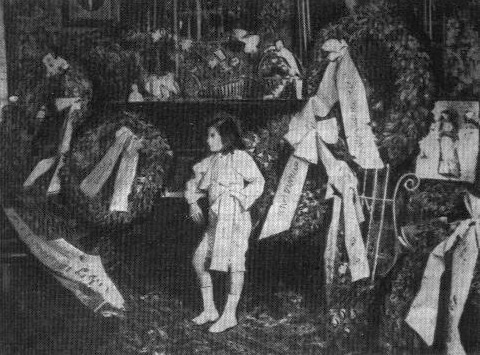
Later in his profile Heuser asks his readers, “Could someone like Alma really change classical music?” It’s a question that critics in other fields would hardly dare to pose. A kid who draws a convincing Mona Lisa isn’t expected to change the history of art, nor is one who puts together sonnets suspected of being the next Shakespeare. Often, what we remember about our favorite writers, painters, and rock musicians is not their technical fluencies, but their biographies. Deutscher “is currently showing her genius and creativity within the realm that she knows,” Martin Campbell-White, her agent, tells Wroe. Is the expectation that, having mastered the 18th century, Deutscher will move on through Wagnerian chromaticism, serialism or minimalism or spectralism or electronics or noise; and in doing so, finally alight on a unique, contemporary voice?
“No discipline has ever been permanently transformed by a child’s revelations,” Solomon writes, and quotes the conductor Leon Bostein, who says, “Prodigies confirm conventional wisdom; they never change it.” In this case, it seems that the conventional wisdom is that classical music is still supposed to sound like Mozart or early Schubert. If it happens to be called a symphony, a sonata, or an opera, all the better. When a child’s early playful, musical experiments become works and incite adjectives like “genius” and “creative,” doesn’t that provoke unfair comparisons? Aren’t we dooming them to failure?
The music critic Janice Nimura sees our fascination with child prodigies yet more cynically. She tells Solomon, “The child prodigy is the polite version of the carny freak. Gawking at the dog-faced boy in the sideshow is exploitative, but gawking at the six-year-old pianist on the ‘Today’ show is somehow okay, even inspiring, demonstrating just how high human potential can soar.”
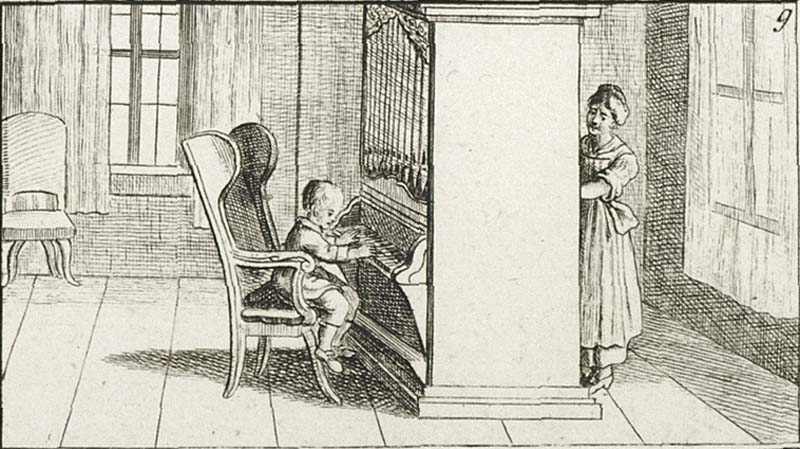
Christian Tetzlaff says, “I mention it when I’m asked, because it’s clearly a very important topic for young people. Thousands of kids get completed burned out and don’t become musicians because they couldn’t survive it. A kid who practices seven hours a day should be referred to UNICEF, in my opinion. It’s child labor. It might seem nicer than working in a factory, but it’s an incredible level of emotional stress for something that really should represent freedom and expanding horizons.”
And then there are the complications: as adults, can we ever really get back into what we would’ve wanted, as children? There’s no way of judging how other people raise their kids, either: at what one point passions become forced, how much to challenge a child, how to support it in a way that will make it healthy, modest, yet self-assured. Deutscher is described as a dreamy girl, playing with her rope, and relaxing into imaginary games that happen to involve music, free of the equalizing, narrowing constraints of school.
It’s impossible to know from the outside what kind of kid Alma Deutscher is—and, and I’d argue, it would be against journalistic ethics to really try to find out. But her success does say a lot about the world of classical music more generally. She has an agent. She has met, and been praised by, Simon Rattle, Annie-Sophie Mutter, and Daniel Barenboim. She has a piano teacher in Switzerland and a composition teacher in Chicago. She has two CDs, one called, as if it were already some kind of retrospective, “The Music of Alma Deutscher.” Her Wikipedia entry has 11 chapters; Helmut Lachenmann’s has six, John Adams has nine, and Caroline Shaw has only a brief biography and list of works. The Telegraph headlines, “Meet Britain’s reluctant heir to Mozart” (Deutscher’s parents reject this comparison, which originated in a tweet). She was on the “Today” show and on Ellen DeGeneres. Heuser tells her that she’ll need publicity, and to do interviews, and she answers, “It’s part of the job.”
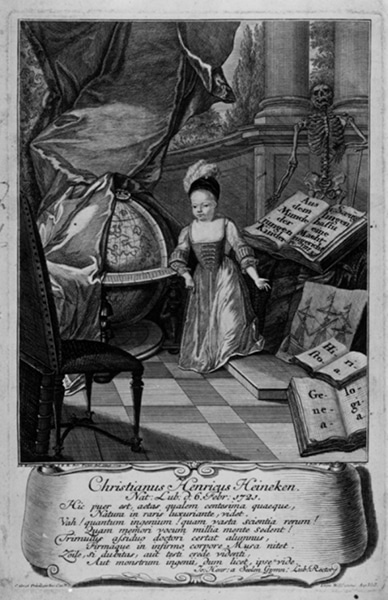
The older the child, the more critical the audience. Deutscher has her own YouTube channel, where a typical comment approvingly contrasts her music with that of “modern” composers. It’s hard to see a kid exposed to the prejudices and bitterness of the internet, and its latent expectations of rise and tragic fall. The violinist Midori suffered from eating disorders and depression for 20 years. In his book, Solomon cites lesser-known prodigies whose careers met tragic ends.
Us as the media—and audiences, agents, presenters, orchestras—have a responsibility to not let all this go too far. There’s a Japanese proverb that says, A prodigy at 10, a genius at 20, an ordinary man at 30. Let’s hope that in Deutscher’s case, this is exactly what will come to pass. After all, ordinariness is often where true happiness is found. ¶
Subscribers keep VAN running!
VAN is proud to be an independent classical music magazine, and we’re able to do so in part thanks to our subscribers. For less than $0.11 a day, you can join our community of supporters, access over 500 articles in our archives, and get new ones delivered straight to your inbox each week.
(PS: Not ready to commit to a full year? You can test-drive VAN for a month for the price of a coffee.)


Comments are closed.